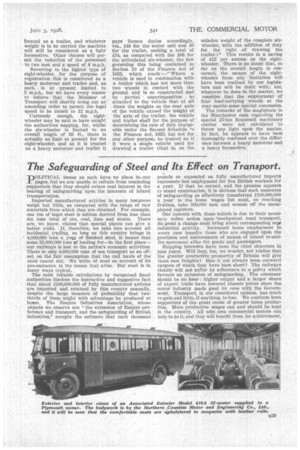The Safeguarding of Steel and Its Effect on Transport.
Page 55

If you've noticed an error in this article please click here to report it so we can fix it.
pOLITICAL issues as such have no place in.our pages, but we are unable to refrain from reminding supporters that they should evince real interest in the bearing of safeguarding upou the interests of inland transportation.
Imported manufactured articles in many instances weigh but little, as compared with the range of raw materials from which they are obtained. For example, one ton of ingot steel is seldom derived from less than six tons total of ore, coal, lime and stores. There are, we know, claims that special plants can give a better yield. If, therefore, we take into account all incidental trading, so long as this country brings in 4,000,000 tons a year of finished steel, it means that some 20,000,000 tons eS loading for—in the first place— our railways is lost to the nation's economic activities. There is only 4,000,000 tons of sea transport as an offset, on thd fair assumption that the rail hauls of the steel cancel out. We write of steel on account of its pre-eminence in the issues that arise. But steel is in many ways typical.
The most reliable calculations by recognized fiscal authorities disclose the instructive and suggestive fact that aboat £200,000,000 of fully manufactured articles are imported and retained by this country annually, despite the large measure of probability that twothirds of them might with advantage be produced at home. The Empire Industries Association, whose objects we observe are "the extension of Empire preference and transport, and the safeguarding of British Industries," accepts the estimate that each thousand pounds so expended on fully manufactured imports represents lost employment for five British workers for a year. If that be correct, and the premise appears to stand examination, it is obvious that such measures of safeguarding as effectively transferred £100,000,000 a year to the home wages list must, on reaching fruition, take 500,000 men and women off the unemployed registers.
Our concern with these beliefs is due to their necessary reflex action upon 'mechanical road transport. So great a change must bring about corresponding ney industrial activity. Increased home employment in every case benefits thoSe who are engaged upon the provision and maintenance of means of inland to-andfro movement alike for goods and passengers.
Shipping intereSts have been the chief objectors in past years. Will they, too, we wonder, not realize that the greater productive prosperity of Britain will give them new freights? Has it not always been outward cargoes of which they have been short? The railways clearly will not suffer by adherence to a policy which favours an extension of safeguarding. The consumer should be no loser : higher output and a larger share of export trade have lowered chassis prices since the motor industry made good its case with the Government. Transport, in or considered opinion, has much to gain and little, if anything, to lose. We continue keen supporters of the great cause of greater home production. More productive wages can and should be kept in the country. All• who own commercial motors can help to do it, and they will benefit from its achievement.




















































































































